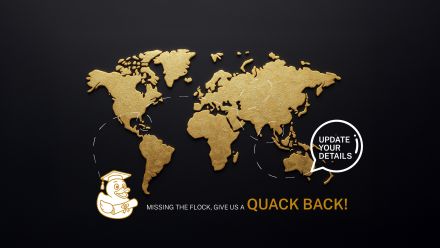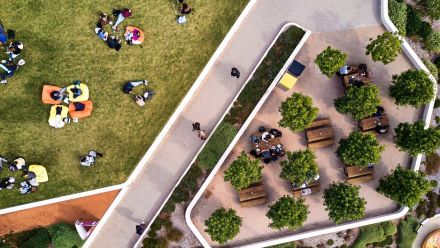$2.5m gift helps Australian aid go further
Adapted from a story by James Giggacher.
In one of the most significant gifts ever given to The Australian National University the Harold Mitchell Foundation has $2.5m changed the ANU Development Policy Centre's ability to help ensure that Australian aid is able to give more to countries in need. Watch the gift announcement.
Professor Stephen Howes is used to thinking about how to make a dollar stretch. As the Director of the Development Policy Centre at the Crawford School of Public Policy in the ANU College of Asia and the Pacific, Howes spends a lot of his time examining how Australian aid can be more effective.
"We set up the Development Policy Centre two years ago in September 2010 with three main objectives," says Howes. "The first was to work on issues of aid effectiveness."This is because the amount of aid Australia gives to developing countries has really shot up; it has more than doubled over the last few years. And we thought there is a real need for more research and analysis around the effectiveness of that aid."Howes and his colleagues at the Development Policy Centre also look at and work on another two major issues in the field of development; the economic development of both the Pacific and PNG and development policy.
"Development policy is often about links that developed and developing countries apart from aid. So we look at things like migration and trade," says Howes.
Howes adds that one of the main motivations for setting the Centre up two years ago was that the issues of aid was often left off the ledger in Australia.
"Traditionally aid has been a bit of a sleeper in Australia, no one has paid it much attention. There are lots of people looking at defence policy, international relations, the rise of China, but very few people actually looking at aid. And that is probably because if you are looking back at the whole period from 1970 to 2000 you see very little increase in the aid budget; it wasn't stagnant but stable, tucked away in a little corner where few people paid attention.
"Since 2000 we have seen this massive scale-up in aid, and the Government has promised more aid in the future, so I think the overriding challenge is to catch up with what is happening in the public policy space and give aid the attention it deserves now that it is a much bigger."AusAID is a much bigger agency and aid spending is a much bigger core on total government spending. So I think catching up with the importance of aid, getting the research done and getting public discussion going, because too often I think whatever little discussion of aid there is tends to be sensationalist, it's often about money being wasted, aid corruption. We want to get beyond those headlines and look at what sort of aid is working, what isn't, what should we do more of and what should we do less of?"
Like the developing countries that Australia donates to, Howes and his team at the Development Policy Centre are set to receive a financial boost which will help them ensure that everyone gains from Australian aid. Thanks to a A$2.5 million gift from the Harold Mitchell Foundation, which will be given to the Centre over the next five years and is being matched by ANU, Howes says that the Centre's ongoing work and research is assured.
"The contribution is really fundamental and critical for our future. What we tried to do for the first couple of years at the Centre is to prove that such a centre could establish itself and make a contribution. A lot of people were sceptical that Australia was big enough to support this kind of effort. The United States, the UK, Canada, they all have these think tanks which work around aid and development issues. So we wanted to prove that Australia was big enough to support such a centre and I think we've proven we can; we've been quite successful in generating the kind of research and debate that we wanted to, and we are now recognised as the place in Australia where leading aid thinking happens.
"But, going forward we need to have a sustainable source of funding and it is very important for our role that we need to be independent, and in particular independent of AusAID. Not because we are hostile to AusAID at all, but because if we are to be a credible, reputable commentator we need to make sure that our independence is guaranteed. That's why getting funding from a source other than AusAID is really important to us. So getting funding from the Harold Mitchell Foundation is really important from that point of view.
"The other thing is that we are in a public policy school, we are like a think tank, so as well as doing really good research we want to host events, we have a blog, we have a public discussion role. So from that point of view it is good to get funding that we can use not only for our research but for things like our blog. So the flexibility provided by the Harold Mitchell funding is really important to us as well as the independence it will give us."
Launched in 2000, the Harold Mitchell Foundation funds programs in health, education and the arts that make a positive and sustainable difference in Australia and the Asia-Pacific.
Speaking about the donation, founder Harold Mitchell AC said: "I am a great supporter of the Australian aid program and I see this funding as an important contribution to supporting accountability and transparency, which are major priorities for AusAID".
You can make a difference too
The ANU College of Asia and the Pacific has the largest concentration of scholars working on the Asia Pacific region in any university in the English-speaking world. Your gift to the College can make a real difference. You may want to support the College's Travel Grants, which give students life changing opportunities to travel in the region, or you may want to donate to Indigenous Scholarships to help grow and sustain the exchange between Asian and Indigenous Australian cultures. Your gift, no matter the size, will make a difference to our students and researchers, and in turn Asia and the Pacific. Donate to the College now.
Further information:
- Watch a video of Stephen Howes discussing the work of the Development Policy Centre on the ANU YouTube channel.
- Find out more about the Development Policy Centre and stay informed by following the DevPolicy blog
- Read more about the Harold Mitchell Foundation gift at the College's gifts and donations website


